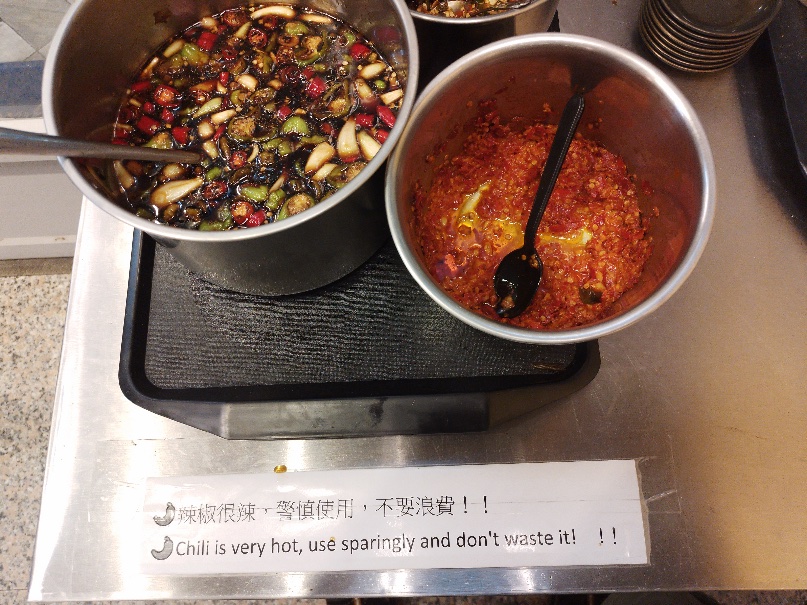Use chili sparingly
« previous post | next post »
From AntC:
Seen in a very typical (but delicious) corner eatery in downtown Hualien, Taiwan.
Surprisingly idiomatic translation: "use sparingly" in Hualien
GTranslate isn't so idiomatic; I'm not able to try DeepL — any better?
I agree with AntC that "use sparingly" is a strikingly fine English expression, one that does not seem possible from a machine, but there's a story behind how it came about that was completely unexpected for me.
Here's what's written on the Chinese label:
Làjiāo hěn là, jǐngshèn shǐyòng, bùyào làngfèi! !
辣椒很辣,警慎使用,不要浪費!!
No sooner had I read that than I felt that it was awkward and unidiomatic in a crucial expression, namely "jǐngshèn 警慎" ("warn; admonish" + "cautious; careful"). Nonetheless, I forced a translation out of it, and came up with
"Chili is hot, use it cautiously, and don't waste it"
GT did something similar:
"Chili is very hot, use it with caution and don't waste it! !"
But, to show you how smart GT is, it had qualms similar to mine and suggested ("Did you mean"):
Làjiāo hěn là, jǐnshèn shǐyòng, bùyào làngfèi! !
辣椒很辣,謹慎使用,不要浪費!!
Guess what GT proffered for a translation for that improved Chinese wording:
"Chili is very hot, use sparingly and don't waste it!!"
Beautiful! I can't think of anything better.
Not only did GT correct the Chinese, it gave a felicitous English translation of its improvement.
Here's what happened with DeepL:
Làjiāo hěn là, jǐngshèn shǐyòng, bùyào làngfèi! !
辣椒很辣,警慎使用,不要浪費!!
Chili pepper is very spicy, use with caution, do not waste!!!
Làjiāo hěn là, jǐnshèn shǐyòng, bùyào làngfèi! !
辣椒很辣,謹慎使用,不要浪費!!
Chili is very hot, use with caution, do not waste!
Although DeepL seemed to hesitate slightly before the former (faulty) version, as though it sensed something was wrong with it, it did not suggest making a change, as did GT.
Oh, BTW:
警慎使用 6,910 ghits
謹慎使用 10,400,000 ghits
No wonder that GT and VHM sensed something was amiss with the original version on the label.
N.B.: Many southern Sinitic topolects don't distinguish between final -n and final -ng.
Selected readings
- "DeepL Translator" (2/16/23)
- "Google Translate is even better now" (9/27/16)
- "Google Translate is even better now, part 2" (5/12/22)
- "The elegance of Google Translate" (3/10/18)
- "The wonders of Google Translate" (9/22/17)
- "Don't blame Google Translate" (2/4/18)
- "Google is scary good" (7/31/17)

AntC said,
June 25, 2023 @ 12:04 am
Thanks Victor, that's interesting.
Chiefly I was bemused there'd be a sign at all (in either language).
The chili was no spicier than usual. Other typical eateries don't put a warning.
Hualien is (was) a big international tourist centre for visiting Tarogo Gorge in the mountains looming over the town/ocean. Especially Japanese tourists — back when there was such a thing.
Is the eatery worried somebody would confuse that with tomato sauce/ketchup?
unekdoud said,
June 25, 2023 @ 1:40 am
I don't have a high tolerance for spiciness, so I have to use with caution on everything lest I waste the whole dish.
A Thai noodle seller near me has a similar "Chilli is hot" sign. It really is, but in the way that hits you hours later when you're least prepared.
Eddie said,
June 25, 2023 @ 1:41 am
As a Cantonese speaker, where 警(ging2) and 謹(gan2) are not homonyms, I can say that 謹慎 is in my vocabulary while the other is not. Searching on Linguee and Ngram Viewer shows that 警慎 does not seem to be attested.
AntC said,
June 25, 2023 @ 9:39 am
@unekdoud I feel your pain!
I thought I was reasonably inured to spicy, having eaten in Indian and Thai places in Britain; then Singapore and Hong Kong. Then I got to actual Thailand …
We could repurpose Mark Twain's gag about distinguishing hot enough to melt a brass door-knob vs 'mild' enough to merely make it mushy.
You'll see from my photo, the sauce other than the undiluted minced chilli still has plenty of chillis, and they're those particularly vicious small shiny ones, with the seeds left in for extra kick. I have to be careful to avoid them, whilst I enjoy the sauce itself.
Tom Dawkes said,
June 25, 2023 @ 11:59 am
DeepL gives "Chili is very spicy, use with caution, do not waste!"
Tom Dawkes said,
June 25, 2023 @ 12:01 pm
Apologies for giving DeepL: I had only read the first couple of lines.
Terry K. said,
June 25, 2023 @ 1:26 pm
I take the sign too be as much about the last bit "don't waste it" as about cautioning people for their own benefit.
Jonathan Smith said,
June 25, 2023 @ 2:47 pm
jǐnshèn 謹慎 ("警慎" being a spelling error most will read right through) doesn't really mean 'sparingly', but rather/more specifically with caution so as to avoid harm… 'prudently'? "sparingly" + "don't waste" in English ends up more redundant than the original. Re: pragmatics, what Terry K. said.
liuyao said,
June 27, 2023 @ 1:30 am
It should be 謹慎, but I missed it on first reading. Does that mean someone typed the characters by way of phonetic input system?
How about "use with dicretion" or "use at your own risk"?
AntC said,
June 29, 2023 @ 12:43 am
@liuyao Does that mean someone typed the characters by way of phonetic input system?
Probably direct voice-to-text on their phone. Hardly anyone inputs text in Taiwan, AFAICT: too much hunting-and-pecking through the drop-down menus of possible soundalikes.
But then I'm confused by Prof Mair's N.B. explaining why the phone 'heard' 警慎使用, final -ng. Southern topolects have final -ng where Northern have mere -n? Or Southern has final -n(g) with point-of-articulation sorta half-way between -n and -ng? Or the voice-to-text knows this is a Southern speaker, so tends to invent -ng where the speaker only said -n?
But, yes, full marks to GTranslate for its "Did you mean …?".